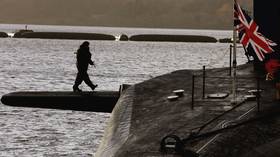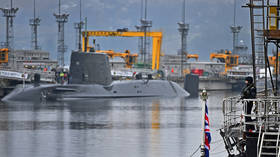British nuclear submarine test fails

The UK Ministry of Defence (MoD) has said an “anomaly” occurred during the test-firing of a Trident missile from a British nuclear submarine off the coast of the US state of Florida last month, raising concerns about the effectiveness of London’s nuclear deterrent.
The UK government confirmed on Wednesday that the drill – which reports say was observed by Defence Secretary Grant Shapps – had failed but insisted that the error was “event specific,” suggesting it would have been successful had it been carrying an actual nuclear warhead. The statement said no further details would be provided for reasons of national security.
UK tabloid The Sun, which first reported the story, said on Tuesday that the missile, which was fitted with fake warheads, splashed back into the ocean after its launch from HMS Vanguard. The state-of-the-art nuclear submarine was not damaged when the 58-ton missile re-entered the Atlantic Ocean.
According to the report, the “anomaly” occurred when the missile’s first-stage boosters failed to ignite after launch. “It left the submarine but it just went plop, right next to them,” the outlet quoted an anonymous source as saying.
Shapps added on Wednesday that “there are no implications for the reliability of the wider Trident missile systems and stockpile,” which he said “remains the most reliable weapons system in the world.”
The last Trident test in 2016 also failed when the missile veered off course, the BBC said, adding that each weapon comes at an estimated cost of £17 million ($21.5 million).
Following reports of January’s failure, Labour’s Shadow Defence Secretary John Healey wrote on social media on Tuesday that the event was “concerning” and called on the UK military leadership to “reassure parliament that this test has no impact on the effectiveness of the UK’s deterrent options.”
In his statement on Wednesday, Shapps said “the UK’s resolve and capability to use its nuclear weapons, should we ever need to do so, remains beyond doubt.”
HMS Vanguard is one of four UK nuclear submarines – with at least one continually at sea. The American-made Tridents can strike targets up to 4,000 miles away and can travel in excess of 13,000mph, the UK Navy said.
Each Vanguard-class submarine can hold as many as 16 intercontinental ballistic missiles (ICBMs), eight Trident missiles, and up to 40 nuclear warheads.













